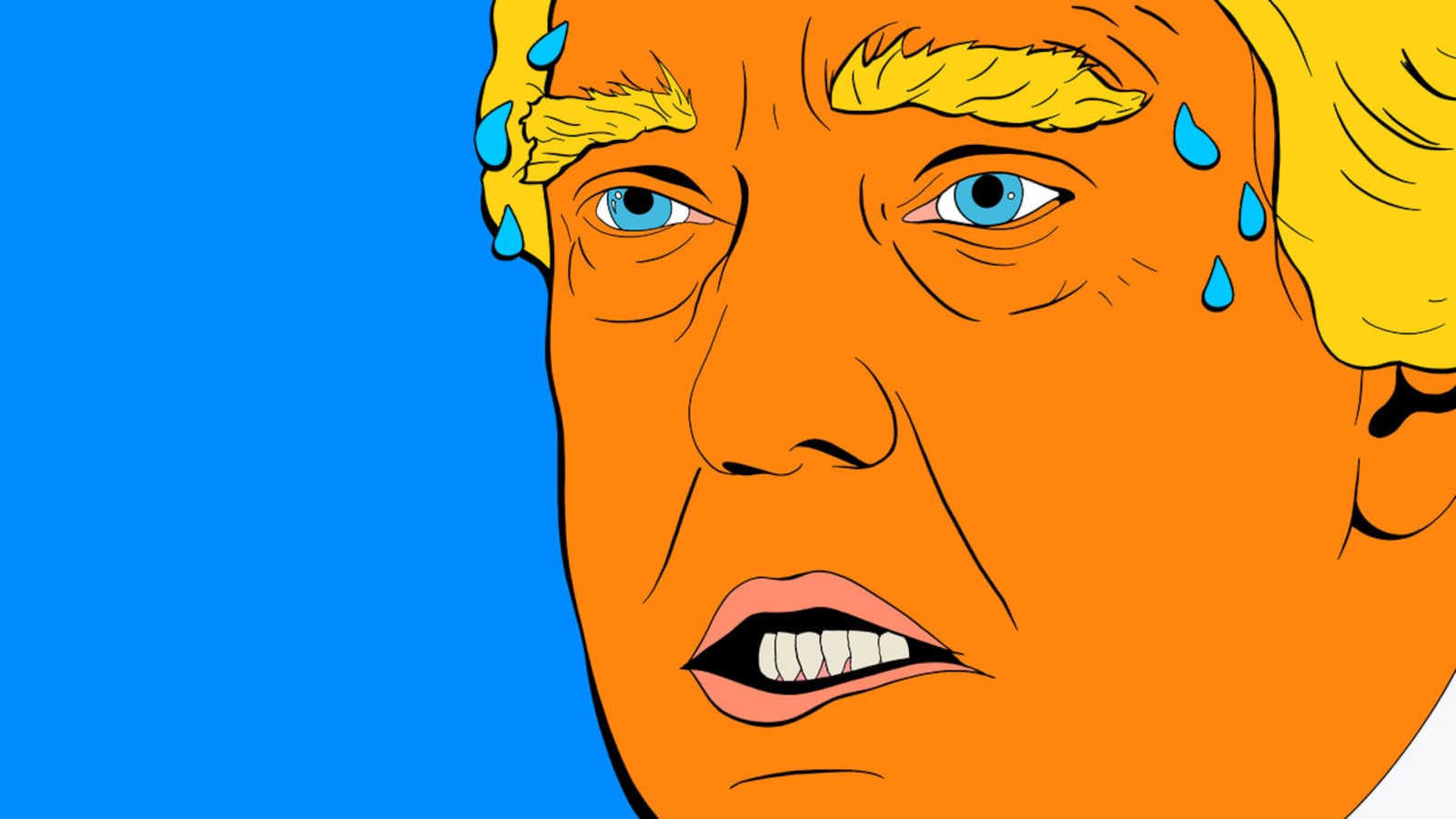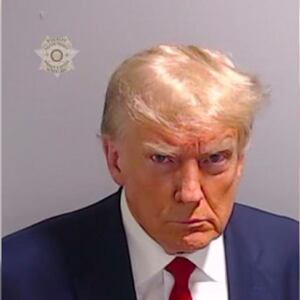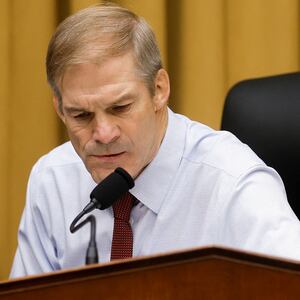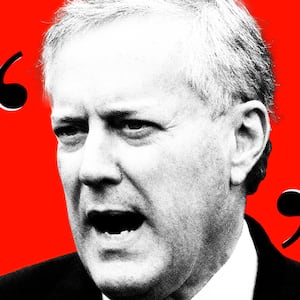It’s an all-out scramble in Atlanta, where former President Donald Trump and his lieutenants in the scheme to overturn the 2020 election are pulling the local district attorney in all directions—chaos that could quickly shift the power dynamic in the coming days.
At least two key players, Trump legal advisers Kenneth Chesebro and Sidney Powell, have made a high-stakes gamble by trying to split apart from the rest and aim for a high-speed trial next month. Meanwhile, the former president’s lawyers want to detach his case too—but say the accelerated schedule “would violate President Trump’s federal and state constitutional rights to a fair trial and due process of law
Judge Scott McAfee is expected to make key decisions in the coming days.
But if the early starters get their way, one thing is certain: The alleged coup plotters have the upper hand—for now.
“I think it’s a win-win for the defendants. The ones going quickly will have the benefit of the state not being fully ready. The state has to prove the case! And the other defendants will get a free preview,” said David Oscar Markus, one of the country’s leading defense lawyers.
Trump and his cohorts will be closely watching whatever transpires during an early showdown in Fulton County courts. Chesebro faces criminal charges over the way he authored a legal memo titled “Statutory Requirements for December 14 Electoral Votes,” which laid out specific instructions on how Trump could use fake electors in key swing states to overturn the legitimate 2020 election results.
Meanwhile, Powell is accused of hiring a local forensic data firm that slipped into a rural county elections’ office to illegally breach computers there—a covert operation that was exposed by The Daily Beast. Both have pending motions to “sever” their cases apart from Trump and the others who were indicted on Aug. 14.
Legal scholars said Trump’s defense lawyers—and the battalion of attorneys representing the nearly two dozen others facing charges—will be taking notes on the tactics displayed in the courtroom.
“The state won’t want to show all their cards, so they may hold some stuff back. In fact, sometimes the state dismisses [a case] against a smaller defendant rather than show its cards for the big target. Now, I don’t think that will happen here because it would be too embarrassing,” Markus said. “Typically the defense loves chaos. Prosecutors hate it.”
District Attorney Fani Willis came bursting out of the gate in full force last month with a 98-page indictment and a declaration that she would seek to undertake this trial of historic proportions in merely six months. The massive size of the case—and the extremely aggressive timeline—was shocking even to legal scholars.
In that sense, Chesebro and Powell are making something of a bet. Asking for an early and separate trial can be interpreted as an attempt to shift the weight of the case back on the prosecutors—who don’t just shoulder the burden of proving the case but also have to contend with pent-up expectations from an American public that has yet to see the nation’s most shameless president held accountable for openly flouting bureaucratic norms, common decency, and the law.
“Prosecutors would very likely like to hold some cards back, but they won’t want to run the risk of bad optics. You don’t want to start it out with headlines that say ‘Chesebro and Powell Acquitted.’ That will send a bad message,” said Ronald Carlson, professor emeritus at University of Georgia’s law school.
Other defendants are poised to go down this route as well. On Thursday, Ray Smith III, an Atlanta lawyer who advised Trump’s fake electors when they met in December 2020, filed a formal request to have his case severed too. His reasoning? It’s getting out of control.
“This case involves too many defendants… too many disparate predicate acts, too many prosecution witnesses, and a complex array of relationships of all the witnesses and defendants for the jury to comprehend,” his four-lawyer team wrote.
So far, attempts by Chesebro and Powell to sever themselves from the case have been met with cheeky commentary by Trump critics who chuckle at the notion that these “small fish” are merely trying to get out while they can. They’ve also floated the theory that they’ll flip on the eve of trial, cutting deals to plead guilty and become star witnesses for the state.
However, University of Alabama law school professor Jenny Carroll noted that these attempts at severance could actually mean the complete opposite: showing loyalty to the boss by helping lob grenades that confuse and slow down the legal proceedings.
“I would be worried that what’s going on here is that these parties are manipulating the process. I think the end goal is to delay until it goes away and until he gets elected president, or everybody loses interest in it,” Carroll said.
The willingness of these defendants to be first to face the fire is really more of an attempt to fracture the case—with the hope that Trump might one day be president again and save them somehow, she said. (To be clear, presidents only have federal authority and cannot legally pardon anyone for state criminal charges. But as Carroll said, these are also people who “drank the Kool-Aid” on Trump.)
“They imagine a world in which Trump gets elected president and all of this goes away,” she said.
The legal maneuvering hasn’t been all bad for Willis.
Trump’s chief of staff, Mark Meadows, has been trying to move his case into federal court, arguing that his actions were all under the scope of his White House duties.
In a somewhat surprising, all-or-nothing gambit, Meadows actually took the stand and testified about his role. And while a judge has not yet ruled whether his trial will move to federal court, Meadows said a number of things the prosecution will likely use against Trump, such as the testimony that presented the former president as the ultimate decision-maker on efforts to overturn the election.
The DA is at a significant disadvantage if she has to retry the case over and over again in separate courtrooms, especially because prosecutors can only present evidence that relates to the person on trial. Splitting them up means that prosecutors can no longer tell a sweeping, cohesive story to back up their claims that Trump’s post-election efforts in Georgia and elsewhere were essentially a criminal enterprise to usurp the nation’s democratic system. Instead, the story will be told piecemeal, which wouldn’t be as compelling or understandable.
We’ve seen this work in the past, Carlson noted. A notable example is the trial of Oklahoma City bomber and white supremacist Timothy McVeigh. Federal prosecutors initially charged him alongside Terry Nichols, another man who helped him plot the bombing that ultimately killed 168 people. But they ended up having separate trials.
“And oh boy did it help him. McVeigh got sentenced to death, and Terry Nichols got life in prison,” Carlson said. “The prosecutors want the parties to be tried together. There's a real tactical advantage. Defendants B and C might see an advantage at pointing their fingers at Defendant A, saying, ‘It was all his fault!’”
The Supreme Court has already weighed in on this topic in general, strongly favoring the idea of one cohesive trial. As the late Justice Antonin Scalia wrote in 1987: “It would impair both the efficiency and the fairness of the criminal justice system to require… that prosecutors bring separate proceedings, presenting the same evidence again and again, requiring victims and witnesses to repeat the inconvenience (and sometimes trauma) of testifying, and randomly favoring the last-tried defendants who have the advantage of knowing the prosecution's case beforehand.”
Besides, prosecutors see a major value in having Trump in the hot seat alongside the 18 others accused of taking part in the effort. Jurors are more inclined to condemn everyone together.
“In this case, Trump is a lightning rod. People know Donald Trump and there’s strong feelings about him. By association, they’re all in league with Trump. If they’re alone, it might not have the same visceral reaction. It starts to look like guilt by association,” said Jonathan Nash, a law school professor at Emory University.
Nash acknowledged that the sheer size of the Fulton DA’s case is hard to fathom. He said that if Willis gets to try the case the way she wants—by dragging everyone into court at once on an expedited schedule—it won’t look like anything we’ve seen before.
“Remember in The Dark Knight when the DA brings in all these defendants and they all shout, ‘Not guilty’? It reminds me of that,” he said.
But trying a case in that manner also runs the risk of making it seem like this law enforcement effort is something of a farce.
“I think it was a huge tactical error for the government to bring a case with 19 defendants,” Markus said.
However, nearly every legal scholar who spoke to The Daily Beast noted that the power dynamic shifts dramatically if Trump’s lower rung co-defendants start pleading guilty or if they lose at a speedy trial next month. Because then, prosecutors might score stronger witnesses they can parade around at Trump’s trial.
Then again, Willis could surprise everyone by dismissing the criminal charges being faced by any defendant who wants to face trial on their own before Trump, a rare move that’s akin to playing chicken and swerving at the very last second. In that scenario, she could still refile charges and indict the person again—perhaps even using the same grand jury true bill.
But at this point, it’s anyone’s guess. This battlefield, as Napoleon Bonaparte once remarked, “is a scene of constant chaos.”









